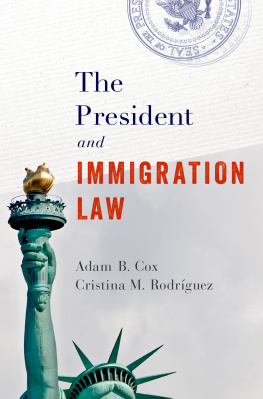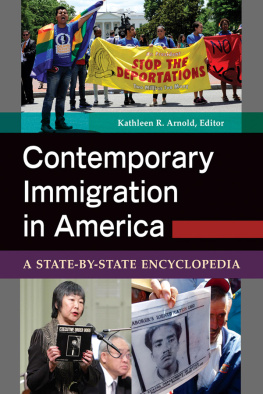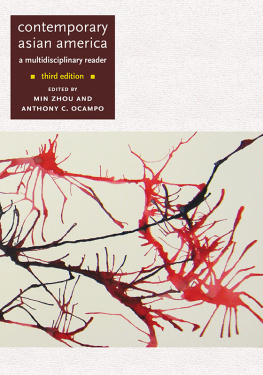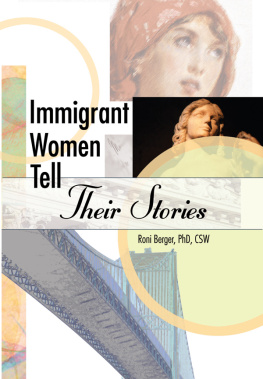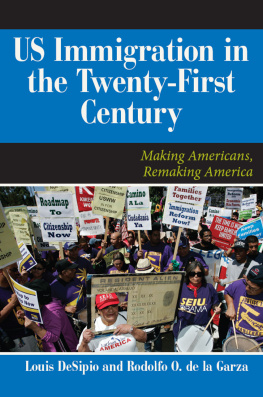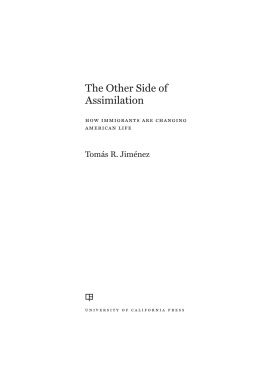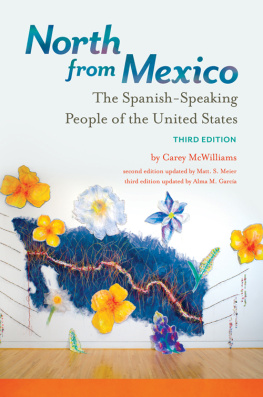Published in 2005 by
Routledge
Taylor & Francis Group
270 Madison Avenue
New York, NY 10016
www.routledge-ny.com
Published in Great Britain by Routledge
Taylor & Francis Group
2 Park Square
Milton Park, Abingdon
Oxon OX1 4RN U.K.
www.routledge.co.uk
Copyright 2005 by Taylor and Francis Books, Inc.
Routledge is an imprint of the Taylor and Francis Group.
Printed in the United States of America on acid-free paper.
10 9 8 7 6 5 4 3 2 1
All rights reserved. No part of this book may be printed or utilized in any form or by any electronic, mechanical or other means, now known or hereafter invented, including photocopying and recording, or any other information storage or retrieval system, without permission in writing from the publisher.
Library of Congress Cataloging-in-Publication Data
Park, John S. W.
Probationary Americans : contemporary immigration policies and the shaping of Asian
American communities / John S. W. Park and Edward J. W. Park.
p. cm.
Includes bibliographical references and index.
ISBN 0-415-94750-2 (he : alk. paper)ISBN 0-415-94751-0 (pb : alk. paper) 1.
United StatesEmigration and immigrationGovernment policy. 2. Asian Americans. I.
Park, Edward J.W. II. Title.
JV6483.P37 2004
305.895073090511dc22
2004010472
Acknowledgments
This project began over dinner, sometime around the time John was finishing his dissertation and Edward was still an assistant professor. Edward was saying how, if the immigration rules passed in 1996 had been passed about two decades ago, there was probably no chance whatsoever that we could have come to the United States. In 1975, our late mother arrived under a family reunification visa sponsored by her older sister, Soo Jin Kim; despite the support she received from her family, Mom and her two boys relied for a time on public assistance programs to make ends meet. (We remember food stamps distinctly, thinking that American money was more colorful than it really was.) Those public assistance programs are no longer available to persons similarly situated, and sponsors of modest means like our aunt are now subject to financial requirements that most could not meet, as well as to financial risks that most would be unwilling to assume.
We witnessed directly some of these dramatic changes to immigration law and policy that we examine in this book. During the last year of Johns dissertation, he worked at Van Der Hout and Brigagliano, an immigration law firm based in San Francisco. There, in addition to the new rules governing family reunification, he learned about labor certifications, H-1Bs, national interest waivers, and how to spot an alien of extraordinary ability. He also saw first hand how powerful information technology firms were recruiting large numbers of immigrants, many from Asia. At the same time, a different team of attorneys at the firm struggled with the new and powerful set of rules governing the removal of immigrants convicted of crimes in the United States. In Los Angeles, Edward volunteered as the Director of Research at the Korean Immigrant Workers Advocates in Los Angeles, where he saw the increasing bifurcation of the Korean American community and the heightened legal and social vulnerability of working-class and poorer immigrants. These experiences at the law firm and at KIWA were invaluable, and this combination of family history, day-to-day work, and community service formed the basic ideas for this book. We would like to thank especially Christine Brigagliano, Roy Hong, and Danny Park for their support.
In 2000, when John finally completed his dissertation in Jurisprudence and Social Policy at the University of California at Berkeley, Michael Omi signed off as one of his advisors. Professor Omi had also been one of Edwards advisors when he had filed his dissertation in the Department of Ethnic Studies in 1993. Professor Omi thus had a major influence on our lives his theory of racial formation, developed with Howard Winant, obviously shaped much of the theoretical framework for this endeavor. His devotion to his students is legendary, and we owe him our most heartfelt thanks.
During the course of this project, we received excellent criticism and many valuable ideas. We would like to thank receptive audiences at the annual conferences for the Society for the Study of Social Problems, the Association for Asian American Studies, the American Sociological Association, and the Law and Society Association, where portions of this book were presented as conference papers. John also gave talks to students and colleagues in the Department of Sociology and in the Department of Asian American Studies, both at the University of California at Santa Barbara. Edward gave lectures for the Program in Asian American Studies at Arizona State University and at the Asian Pacific American Law and Public Policy Conference at Harvard University. The interest and support generated from these lectures gave us further incentives to push forward.
From the University of California at Santa Barbara, we received grants from the Academic Senate, as well as a Regents Junior Faculty Fellowship. Both sources were critical for gathering materials for this project, and we are especially grateful to Associate Vice Chancellor Maria Herrera-Sobek for her constant support. We also received financial support from the Rains Academic Research Assistant Program and the Deans Office of the Bellarmine College of Liberal Arts, both at Loyola Marymount University.
Our first editor at Routledge, Vikram Mukhija, supported this project from its inception, and Karen Wolny and Robert Tempio patiently waited for its completion. Sylvia Wood oversaw the final production process, and Jacquelyn Bergeron facilitated correspondence and other administrative matters for the Press.
At Santa Barbara, Hung Cam Thai, Celine Parrenas Shimizu, Diane Fujino, Xiaojian Zhao, and Douglas Daniels have been wonderful colleagues. Xiaojian Zhao and Douglas Daniels have truly gone out of their way to support John professionally and personally. Howard Winant in Sociology has also been very encouraging and enthusiastic about this and other projects. Venus Nasri and Arlene Phillips have created a most pleasant work environment in Johns home department.
At Loyola Marymount University, Kenyon Chan and Fr. Michael Engh, former and current Dean, respectively, of Bellarmine College of Liberal Arts, each provided support and encouragement. Excellent administrative support from Sarah Harkness allowed Edward to redirect precious time and energy from administrative duties to research and writing.
Malisa Lee, Kristyn Kifune, and Kimberly Schreiber provided valuable research assistance at Santa Barbara, as did Kaeleen Ng, Krystle Swaving, and Gilbert Visser at Loyola Marymount.
Finally, we would like to thank our families for their love and devotion, especially during the past four years weve been working on this book together. Edward would like to thank his wife, Reiko Furuta, for her generosity and understanding during the most difficult stages of research and writing, particularly during the many weekends spent ninety miles away in Johns office in Santa Barbara. Ben and Hideko Furuta have provided love and encouragement not just for this project, but for all of Edwards personal and professional ventures for the past fifteen years. Matthew and Elise Park provided wonderful distractions.
Gowan Lee, Johns better half, waited and waited patiently for him to complete yet another book, one that he kept promising and promising would be done soon. John is yet again thankful for her patience, faith, and love. Cowans parents. Hung Ku Lee and Joung Sun Lee, have always been generous, wise, and also very patient. And of course, John would like to thank and acknowledge his own lovely distractions Zoe, Isabel, and Sophie.



